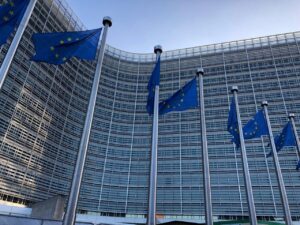Applying the EU’s Third Energy Package rules to Nord Stream 2 is possible, but Russia has tools to sidestep the regulations. If that happens, access to the pipeline for exporters independent of Gazprom and the Russian state would be illusory. The European Commission can prevent this scenario by ensuring the application of EU law not only by amendments to the gas directive but also through political negotiations on the status of Nord Stream 2 and ensuring Russia fulfils the agreement.
The EU’s planned amendments to the gas directive would end the controversy surrounding the applicability of European law to the Nord Stream 2 pipeline. The regulations stemming from the gas directive would force Gazprom to use a transparent tariff system and ensure non-discriminatory access to the pipeline for independent exporters (Third-Party Access, or TPA). Despite referring to the pipeline as a “European project,” Russia opposes applying EU rules to it because it would require concessions on the Russian internal energy market. TPA would mean companies other than Gazprom could utilise the pipeline’s capabilities on the Russian end. That would set a precedent, so Russia rejects the need to regulate the status of the pipeline and wants to maintain Gazprom’s export monopoly.
Russian Gas, a Rationed Export. Gazprom, the sole owner and intended future operator of Nord Stream 2, dominates the Russian gas market and has few domestic competitors. In 2016, the amount of natural gas produced in Russia stood at 651 bcm, of which Gazprom and its subsidiaries produced 421 bcm, and “independent producers” Novatek and Rosneft generated about 50 bcm each. Gazprom, as the owner of Russia’s Unified Gas Supply System, has a monopoly guaranteed by law to export natural gas through pipelines. In 2013, Russia liberalised its regulations and allowed other companies to export liquified natural gas (LNG); currently, Novatek and Rosneft are the only beneficiaries of these changes. Russia did not, however, liberalise the law on pipeline exports, despite the efforts of Rosneft (headed by Igor Sechin, a close associate of President Vladimir Putin, a former vice prime minister and one of the most powerful figures in Russia) and the recommendations of the Security Council of Russia (which includes council secretary Nikolai Patrushev, who is associated with Sechin’s siloviki clan). Rosneft has been lobbying unsuccessfully for access both to Gazprom’s Power of Siberia pipeline to China and Nord Stream 1 to export natural gas for BP, the UK energy firm. Novatek is also seeking liberalisation of export regulations, but lacking success there, too, it focuses on LNG exports.
The most formidable EU legal requirement for Russia could be TPA, which would ensure access to Nord Stream 2 for companies other than Gazprom. In theory, it could trigger changes in Russia’s own regulations, gas market, and politics. Legal changes to liberalise exports could result in market and political consequences, such as strengthening the position of players tied to Rosneft and Novatek. Making concessions under EU pressure would be viewed as harmful to Russian prestige. But even if Russia’s leaders make such concessions, they would do so only through their own rules while maintaining tools to sidestep the EU’s Third Energy Package rules.
(In)dependent Gas Producers. Although Gazprom has competitors in Russia, the connections to the Kremlin of two of the largest ones, along with Gazprom itself, makes it difficult to call them independent. Most of the shares in Rosneft are owned by Rosneftegaz, a state-controlled company. Rosneft itself is headed by Sechin and Gerhard Schröder, the former German chancellor who is now the chairman of Nord Stream 2 AG (wholly owned by Gazprom). Gennady Timchenko, one of Putin’s closest allies, is a member of Novatek’s board of directors. His Volga Group owns 23% of Novatek. Most of Gazprom’s shares are owned by the state, either by the Federal Agency for State Property Management (part of the Russian Ministry of Economic Development) or state companies, including Rosneftegaz. The CEO of Gazprom, Alexey Miller, is a Putin associate from their time in St. Petersburg, where Putin was mayor. Patrushev’s son, Dmitry, is also a member of Gazprom’s board of directors. Such close personal and business connections, as well as the Russian leader’s practices, suggest that strategic decisions (like those regarding gas exports) will be made by the ruling elite of Russia, or at least with its consent. They will allow the participants to make package deals favourable for some state-related companies as an offset for concessions. For example, the authorities could abolish the cap on the amount of natural gas Gazprom can sell on the St. Petersburg Exchange (where prices are not regulated) to offset the loss of its export monopoly. Another tool that can be used by the state is tax regulation, which can change to meet the current political needs. These are not the only measures to balance power between the actors among Russia’s ruling elite. The Kremlin can, for instance, make Rosneft or Novatek the operator of Nord Stream 2, which would distance the project from accusations that Gazprom will block access.
Russia could also use European Nord Stream 2 investors (Uniper, OMV, Shell, Wintershall, Engie), whose subsidiaries would act as independent exporters, to blunt criticism. These firms already have access to gas fields in Russia. In the Yuzhno-Russkoye field, crucial for Nord Stream 1 deliveries, Wintershall has a 35% stake and OMV acquired 24.99% from Uniper this year. European companies are also present in the Urengoyskoye field to the south. Wintershall has 25.01% in two blocks and OMV at the end of 2016 signed a binding agreement on an asset swap with Gazprom which would give the former 24.98% of those same two blocks. If it chooses this European partner scenario, Russia can selectively endorse one or more of these companies as participants in the Russian market while blocking their competitors through unofficial measures such as tax investigations or infrastructure “failures.”
Conclusions. Applying the EU’s Third Energy Package to Nord Stream 2 is a very important political and regulatory issue for the Union. However, these regulations in practice could prove ineffective—Russia will be able to sidestep them by nominally following the regulations. The European Commission does not have effective tools to control the Russian gas market and, therefore, for ensuring compliance with the TPA rule in practice. It will depend on Russian goodwill.
On the other hand, if EU gas-directive amendments are approved, they would be immediately in effect on Union territory. That would oblige the Member States to demand that companies operating in the Union follow EU law. For Gazprom’s European partners, it adds further risk—beyond possible new U.S. sanctions and the change of the Nord Stream 2 route in Danish territorial waters—associated with participation in the project. This risk alone, however, does not necessarily mean the pipeline will not be completed.
Taking all this into consideration, the political negotiations on Nord Stream 2 (the EU-Russia intergovernmental agreement proposed by the European Commission) should be seen as an important process complementary to the gas-directive amendments. Any negotiations, as well as a future agreement, must ensure EU legal applicability to Nord Stream 2. The agreement should include the possibility for the EU to impose fines on Gazprom (as the owner and investor in Nord Stream 2 and the owner of Russia’s Unified Gas Supply System) and/or its European subsidiaries in case of any violations. It should also require Russian state institutions to follow the agreement’s principles, as supervised by the European Commission. Setting a consistent EU position in this case will create the opportunity to effectively apply the Union rules to Nord Stream 2. It is clear that in the absence of effective tools to enforce EU law, Russia will not hesitate to bypass the Third Energy Package rules.
Source: PISM








